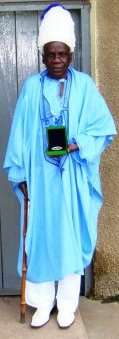Agofe
Agofe is the noble title for the chief cultural leader or king among all the Lugbara people. The term means 'Pillar' but a king is also called opi in Lugbara. An opi is usually the clan leader of a lineage.[1] In 2012, the Government of Uganda finally recognised this revised institution.[2] The Agofe's duty will be to preserve Lugbara culture through writings and other assignments.
Authority
In the past, the Lugbara only had their respective clan chiefs. So, some people opposed this development. However, under the constitution of this modern cultural institution, leadership will be democratic like an elective monarchy in rotational series of five years amongst the six Lugbara counties in Uganda including Aringa, Ayivu, Madi, Maracha, Terego and Vurra plus those in DR Congo and the diaspora. Although a territory for Kakwa people, Koboko is also included because pupils are taught in Lugbara there. A king (Agofe) who has already served one term can be eligible for re-election depending on his performance. Also, a ruling Agofe can be replaced depending on his character and other failings.

Jason Avutia is the first (and current) Agofe. He resides in (Mvara Parish of) Arua Town, the cultural headquarters, where he has headed the Association of Arua District Elders for two decades. Many people knew him as the Chairman of LULA (Lugbara Literature Association) but he was also an Education Minister in his younger years.
To qualify as the Agofe, any Lugbara must have a minimum age of 55 years.[3]
See also
References
- Arua Today. "Arua Today". Arua Today. Archived from the original on 2012-02-10. Retrieved 2012-10-26.
- "Government finally recognises Lugbara cultural institution". Ugandaradionetwork.com. Retrieved 2012-10-26.
- EA (2009-11-23). "Lugbara Kari (The House of Lugbara)". Lugbaraculture.blogspot.com. Retrieved 2012-10-26.